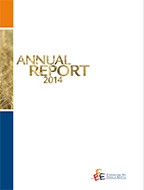Annual Report 2014
On June 7, 2014, FEEM celebrated its 25th anniversary, witnessing a long standing commitment to scientific research on the environment, energy and the economy, and in particular on the economics and politics of climate change.
While this report is being published, the sustainability debate is gaining momentum all over the world in preparation for the next UN Conference of Parties (COP21) of the UN Framework Convention on Climate Change that Paris will host in December. Responding effectively to climate change will indeed be crucial for sustainable development, as climate change is without doubt one of the major challenges of today and probably one of the defining issues of our time. As recently stated by UN Secretary-General Ban Ki-moon, mitigating climate change and adapting to its effects are necessary to reduce inequality and achieve equitable and sustainable economic development.
If 2014 has been an important year for the economics and politics of climate change with the release of the IPCC’s Fifth Assessment Report (AR5), 2015 will be even more so. This year Pope Francis is expected to publish an encyclical on climate change. In July, the United Nations will hold a conference on financing for development in Addis Ababa, Ethiopia. In September, the UN General Assembly will convene in New York to launch the sustainable development goals (SDGs), and in December, world leaders will attend COP21 in Paris to sign an important deal to control greenhouse gas emissions worldwide. On that occasion, governments of all UN member states will have a special responsibility to agree to a bold climate agreement that confines global warming to a limit safe for humanity for a sustainable future for all.
Human-induced climate change is a scientific reality and a real threat to people around the world, especially in developing nations, and its decisive mitigation is an imperative for humanity. For this reason, governments, delegations, institutions, NGOs, companies, universities, think tanks and research institutes are mobilized on the road to Paris. As a groundbreaking actor in the international climate change debate since the early 90s, FEEM will give its contribution to many of these important events and is playing a key role in several national and international preparatory research meetings and projects.
Since 1995, FEEM has indeed been contributing to the United Nations Framework Convention on Climate Change (UNFCCC) negotiation processes. FEEM has also regularly given its scientific contribution to the Intergovernmental Panel on Climate Change (IPCC), in particular to the working group dealing with the possible pathways for mitigation of greenhouse gases and related costs, with an increasing number of FEEM researchers as Lead Authors of the Assessment Reports (ARs) drafted throughout the years. Since 2009, Prof. Carraro, at the time Chair of FEEM Advisory Board and now coordinator of FEEM Climate Change and Sustainable Development program, has been appointed member of the IPCC Bureau and Vice-Chair of IPCC WG III.
More recently, in February 2015, FEEM, together with scientists from Harvard and Stanford and other important research organizations who contributed to the IPCC’s AR5, representatives from national governments and intergovernmental organizations and other stakeholder groups, gathered together to explore approaches to improving the process by which research on climate change is assessed — with a focus on the social-sciences (economics, political science, policy studies),and discussed potential reforms in IPCC assessments. Following this important event, FEEM has contributed to the preparation of a memorandum describing specific challenges and opportunities facing the IPCC and providing recommendations for improving the IPCC’s process of assessing scientific research on climate change.
Since 2005, FEEM is also among the founding members of the Euro-Mediterranean Center on Climate Change (CMCC). As member of the CMCC, FEEM has continued to support the Italian Ministry of the Environment in official climate negotiations and in responding to formal requests from the European Union (for instance in drafting the National Adaptation Strategy).
Today, after 25 years of top-level research on climate change, FEEM has achieved a leading position within the international research community, and is now a recognized research institute within the European and global context also thanks to the development and application of advanced modelling for the economic analysis of climate policies addressing world-wide vulnerability to changes in climatic conditions, and investigating the economics of mitigation and adaptation to these changes.
In the 1989-2014 period FEEM has been involved in over 90 research projects on the economics of climate change, the majority of which funded by the European Commission, witnessing its continuous support to policy and institutions. In the same period it has organized over 360 international conferences and workshops, including side sessions in several COPs, about 340 seminars and 25 summer schools on climate change and related issues. Finally it has published 276 working papers, 186 amidst reports, in-depth analyses, policy briefs and articles, and 20 books in the field of climate change. Last but not least, FEEM scientific contribution on climate change has also been published in several articles appearing in international top field journals, including Nature Climate Change and Nature.
To sum up, the dual commitment of FEEM research on climate change is to contribute to science while guiding policies and informing the public debate. Through its research, FEEM is indeed at the same time strongly society and policy oriented, combining the scientific, peer-reviewed academic approach with the diffusion of its main achievements and research results to the civil society and policy-makers, at both local and global level. Environment, energy and sustainability will thus remain at the core of FEEM’s future agenda, maintaining a plurality of perspectives and multidisciplinary approaches which have always been a distinct trait of FEEM’s activities.

